James Monroe (1758 – 1831) was the fifth President of the United States who served for two terms from 1817 to 1825. His presidency is most known for achievements in foreign affairs including the Monroe Doctrine, which is considered a defining moment in U.S. foreign policy. Apart from being President, Monroe held several important positions during his political career including Governor of Virginia, and Minister of State under President James Madison. He is also known for participating in the American Revolution. Here are the 10 major accomplishments of James Monroe including his achievements as president in domestic and foreign policy, and those in his pre-presidency political career.
#1 HE PARTICIPATED IN THE BATTLE OF TRENTON
James Monroe served as an officer in the Continental Army during the American Revolutionary War. During the Battle of Trenton, Captain William Washington led a successful assault into the town of Trenton to seize the guns before they could be used. 18-year-old Lieutenant Monroe was severely wounded in the assault and was just about saved from bleeding to death by a young volunteer doctor named John Riker. James Monroe is regarded as the last U.S. President who was a Revolutionary War veteran since he served as an officer and also took part in combat.

#2 He SERVED AS U.S. MINISTER TO FRANCE FROM 1794 TO 1796
In 1790, James Monroe was elected by the Virginia legislature as United States Senator. In 1794, he resigned from the senate as he was appointed Minister to France by President George Washington. As ambassador to France, Monroe arranged for the release of all Americans held in French prisons. He also secured the release of Thomas Paine, an influential political activist and philosopher who is considered one of the founding fathers of the United States. Due to his support of revolutionary France, Monroe was discharged from his post of Minister to France by President Washington in 1796.
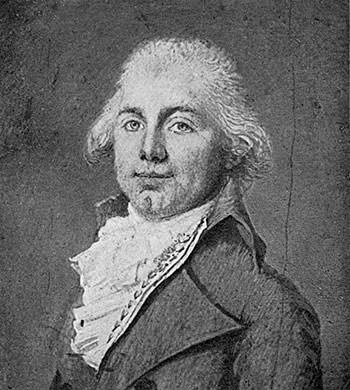
#3 HE SERVED AS SECRETARY OF STATE AND SECRETARY OF WAR
James Monroe was elected Governor of Virginia in 1799 and served his first term till 1802. In 1811, he was again elected Virginia’s governor but served for only four months. Under President Thomas Jefferson, Monroe served as U.S. Ambassador to the United Kingdom from 1803 to 1807. In 1811, President James Madison appointed him as Secretary of State. During the War of 1812 against Great Britain, President Madison also appointed Monroe as Secretary of War and he served in this capacity from September 1814 till a peace treaty was ratified in February 1815. Monroe continued as Secretary of State till March 1817.
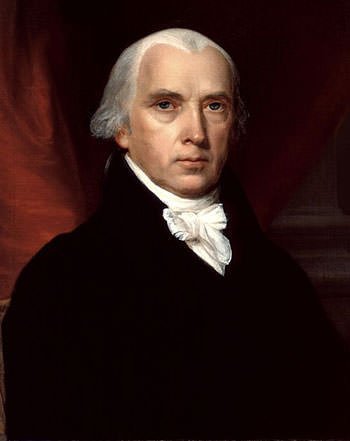
#4 HE SERVED AS THE FIFTH PRESIDENT OF THE UNITED STATES
Monroe won the 1816 United States presidential election by defeating Rufus King by a wide margin of 183 to 34. In the 1820 re-election, he was elected almost unopposed winning more than 80% of the popular vote. He was prevented from a unanimous electoral vote by a single vote for John Quincy Adams. The 1820 US Presidential election was the third and last in which a candidate ran effectively unopposed; the previous two unopposed elections being those of 1788–89 and 1792 in which George Washington was elected. James Monroe served as the fifth President of the United States from March 4, 1817 to March 4, 1825.
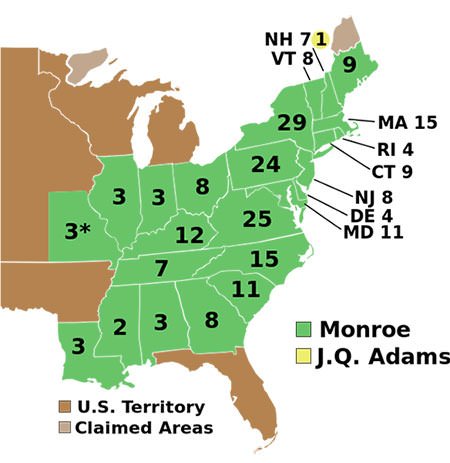
#5 HIS PRESIDENCY IS CLOSELY ASSOCIATED WITH THE ERA OF GOOD FEELINGS
The Era of Good Feelings is a term used to refer to the period after the War of 1812 which saw an end to bitter political divisions between Federalists and Republicans. During his presidency, James Monroe largely ignored affiliations to a party while making appointments, thus allowing the era to continue. He also made two long national tours in 1817 to build national trust, during which the term for the period was coined. Monroe worked towards national unity and elimination of parties from the American political system. So thoroughly had he reduced party politics that he essentially ran unopposed in the 1820 presidential election. Era of Good Feelings coincided with Monroe’s presidency and saw the collapse of the Federalist Party. However later developments saw the re-emergence of the two party system.
#6 TREATY OF 1818 WAS SIGNED During HIS TERM
Under the presidency of James Monroe, Treaty of 1818 was signed between the United States and the United Kingdom to resolve long standing boundary issues. It resulted in the settlement of the disputed region of the Pacific Northwest known as Oregon Country in America. The two nations agreed to a boundary line involving the 49th parallel north. Britain ceded all of Rupert’s Land south of the 49th parallel and west to the Rocky Mountains while the U.S. ceded the northernmost tip of the territory of Louisiana above the 49th parallel. Treaty of 1818 greatly improved U.S. relations with U.K. and Canada.
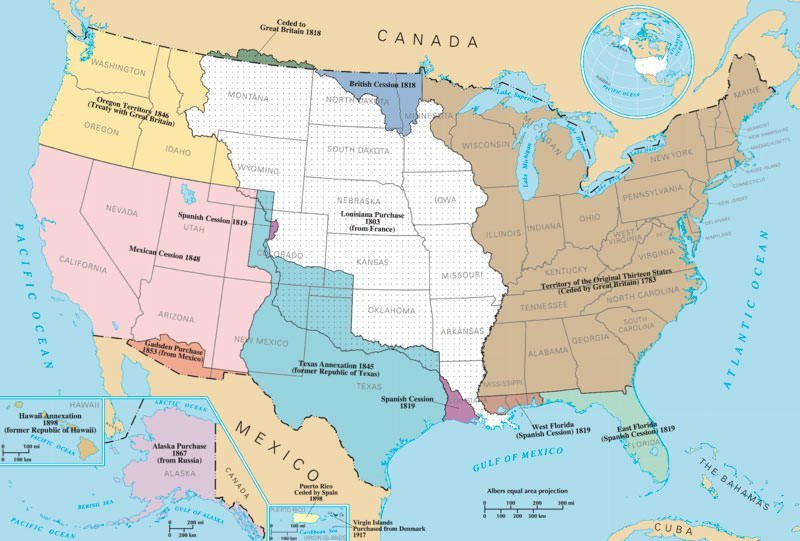
#7 THE FLORIDA PURCHASE TREATY WAS SIGNED DURING HIS PRESIDENCY
Spain had long rejected repeated American efforts to purchase Florida. However, due to Latin American Wars of Independence and no Spanish presence in Florida, the region had become a burden to Spain. In 1819, Secretary of State under President Monroe, John Quincy Adams negotiated a treaty with Spanish foreign minister Luis de Onis by which Spain would cede Florida to U.S. and in return U.S. would assume liability for $5 million in damage done by American citizens who rebelled against Spain. Known as the Adams–Onis Treaty or Florida Purchase Treaty, it was considered a triumph of American diplomacy.

#8 HE EXTENDED RECOGNITION TO THE NEW COUNTRIES FORMED IN LATIN AMERICA
By 1823, almost all Latin American colonies of Spain and Portugal had achieved, or were at the point of gaining, independence from the Portuguese and Spanish Empires. James Monroe told the ambassadors to these new countries to declare that United States recognized them as independent and would support inter-American congresses dedicated to the development of economic and political institutions fundamentally differing from those prevailing in Europe. An American system distinct from that of Europe was the basic tenet of James Monroe’s policy toward Latin America.
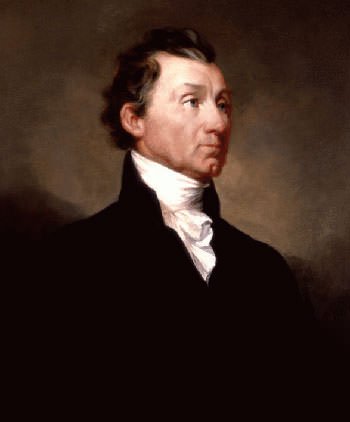
#9 MONROE DOCTRINE IS CONSIDERED A DEFINING MOMENT IN U.S. FOREIGN POLICY
James Monroe’s most famous achievement was the declaration of the Monroe Doctrine to Congress on December 2, 1823. Authored by John Quincy Adams, it stated that U.S. would regard further efforts by European nations to colonize states in the American continents as acts of aggression, requiring its intervention. However, it would not interfere in the affairs of existing European colonies, implying it wouldn’t support the independence movements taking place in the Americas. Monroe Doctrine is considered a defining moment in U.S. foreign policy and it is one of its longest-standing principles. It would be invoked later by several U.S. presidents including Theodore Roosevelt, John F. Kennedy and Ronald Reagan.
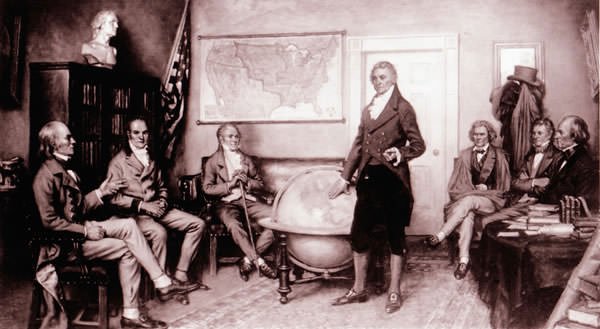
#10 CAPITAL CITY OF LIBERIA IS NAMED AFTER Him
The American Colonization Society (ACS) was established in 1816 to support colonization of free African Americans in Africa to remove free blacks from America and avoid slave rebellions. From 1821, thousands of free black Americans moved from U.S. to colonies in Africa. These colonies ultimately formed the nation of Liberia in 1847. Though the aim of ACS cannot be considered noble, it did help in the establishment of the country of Liberia. As president, James Monroe was a supporter of moving freed slaves to Africa. Monrovia, the capital and most populous city in Liberia, is named after him. It is the only non-American capital city named after a U.S. President.
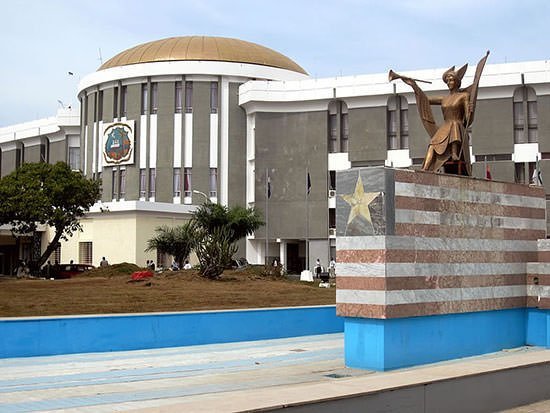
THE MISSOURI COMPROMISE
Under the presidency of James Monroe, the Missouri Compromise was passed as a law in 1820. It regulated slavery in the country’s western territories except within the boundaries of the proposed state of Missouri. It was agreed to by both the pro-slavery and anti-slavery factions in the United States Congress. The Missouri Compromise led to disappointment for African-Americans in both the North and South. It stopped the southern progression of gradual emancipation and legitimized slavery as a southern institution. The provisions of the Compromise forbidding slavery in the north of Louisiana Territory were later repealed by the Kansas–Nebraska Act of 1854. This repeal caused an outrage in the North and is considered one of the events leading to the American Civil War.


this was very helpful
Happy to help.
Thank you very much! Very helpful!
Happy to help.
this could not have been more helpful with my project, thx.
Happy to help.